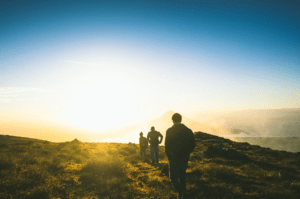

The advancements in technology have given the world so many boons—global connectivity, life-saving discoveries and inventions, and access to so much information. But along with these benefits are also several drawbacks. The internet, which its countless diversions and anonymity, has negatively affected people’s ability to concentrate, distinguish facts from opinion, and empathize with other people.
As the world moves closer to modern life and urban dwellings, there’s a greater need for people to spend time outdoors and reconnect with nature. Here are five compelling reasons.
Boost Physical Health
Going outdoors is the best way you can soak in some sunshine and get your much-needed doses of vitamin D, which is essential for boosting the immunity, absorbing calcium, and strengthening bones. Outdoors, especially in nature, you’re able to breathe in air that’s cleaner and healthier for your lungs.
Be it hiking, camping, cycling, or just walking around the park—every outdoor activity compels you to get moving and exercise your body, which, as everyone knows, is necessary to stay healthy.
People who engage in more outdoor activities, like cycling or running, also help with losing weight and developing better coordination, balance, agility, power, and stamina. But getting optimum results will require pushing your gradually physical limits.
Cyclists, for example, train by slowly increasing the speed and duration of their rides and using tools such as a cycling power meter to monitor their performance. Hikers and mountaineers too build their endurance and experience before they tackle high-level trails.
Improve Mental Health
Like your physical health, your mental well-being should receive proper attention and care. Spending time outdoors is essential for your mental health, and soaking in enough sunshine benefits not only the body but also the mind. Exposure to sunlight combats symptoms of a seasonal affective disorder, or SAD, which a type of depression that is triggered by the seasonal changes.
Time outdoors also boost your quality of sleep—which everyone knows is essential for managing your mood, handling stress, and improving behavior. Doing outdoor activities, where you’re exposed to sunlight and compelled to exercise your body, regulates your circadian rhythm and helps you get a restful sleep at night.
Outdoor activities can also stimulate the mind in different ways. Hiking challenges you to navigate through rough and unfamiliar terrains and use your knowledge, understanding, and skills without all the conveniences you have in the city.
Regulate Stress Levels
Taking a stroll through a forest, which experts call as “forest-bathing,” decreases levels of cortisol (a.k.a. the stress hormone). A quick nature walk can ease any tension and pressure you feel. Your brain enters a relaxed and meditative state, helping you decompress and reduce stress levels when you walk through foresty spots or areas filled with greeneries.
Increase Your Creativity
Spending time outdoors takes you away from the internet and all the mindless distractions it offers. It helps you get away from the drama and overwhelming stimuli from daily life, giving your brain the opportunity to wander and explore thoughts and ideas. Oftentimes, it’s when you’re not focusing on a specific thing or distracting yourself that “Eureka!” moments occur.
Focusing is necessary for productivity, but “unfocusing” is what you need to be creative. While the brain never truly stops until a person dies, bouts of unfocusing or idleness allow it to rest, which is also helpful when you need to concentrate later.
Helps You Get Closer with Nature
Connecting with nature deepens your understanding of the world and yourself. People who spend a lot of time in nature will tell you that it helps them gain perspective of their place in the world.
Witnessing the wonders of nature also reminds them that humans aren’t the only beings in this earth. And that despite their ability to think in complex patterns and technological innovations, humans are not superior to nature itself or other creatures, and people should live in harmony with them.
Final Word
The outdoors provides an environment that simultaneously stimulates and relaxes the mind and body. Outdoor activities force you to get moving and exercise your muscles and bones. Getting away from the hustle and bustle of the city lets you breathe, rest, and relax, which is essential for your mental health.
So the next time you have a free weekend, go cycling with your friends or go hiking at the nearest nature trail. If you can’t find the time, strolling around your local park will do too.
What kind of outdoor activities do you do, and how have they improved your well-being? Share your stories and answers in the comments section below.








